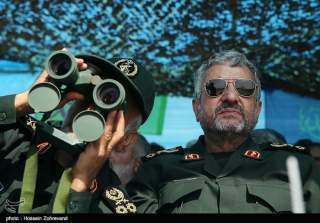Why Is Iran Fighting This Kurdish Group Again After 20 Years?
Don’t assume the PDKI fight is a proxy war.
Claims or suspicion that the escalation of PDKI activity inside Iran is a function of a regional proxy war also implies that the group is incapable of strategic autonomy, which is supported by absolutely no evidence whatsoever. They also ignore the fact that for the PDKI, contrary to the examples of Israel and Saudi Arabia discussed above, the current geopolitical environment in the region alone incentivizes them to step up their activity against Tehran—with or without external or foreign impetus.
In most places one looks lately, Kurds, or at least their regional profile, seem to be on the rise. In Syria, the declaration of the Federation of Northern Syria–Rojava earlier this year represents one of the most significant developments in Kurdish nationalism since the nineties, when Iraqi Kurdistan began to exert itself as an autonomous region. In both Syria and Iraq, various local Kurdish groups and their peshmerga units have proven themselves to be among the most reliable and competent ground partners of the anti-ISIL coalition (sans Turkey). Not to mention the fact that certain factions in Iraqi Kurdistan seem to get more nationally ambitious by the day. In such an environment, the PDKI has more than enough motivation to raise its own profile on the regional stage, and needs no one else to tell them this.
When you consider Saudi Arabia’s alleged desire to create a Greater Kurdistan to weaken its regional rivals in Ankara and Tehran, and the fact that Western states (namely the United States) seem to be relying more and more on Kurdish peshmerga units in the fight against the Islamic State in Syria and Iraq, it’s quite conceivable that the PDKI thinks its time has come as well. If it were able to grow their support base amongst the Kurdish population of Iran and present itself as a legitimate headache for Tehran, it could use such a profile to leverage its way into the relationship with Western/regional states that its Iraqi and Syrian brethren now enjoy.
That’s not to say that one of Iran’s regional rivals might not one day decide to ally itself with the PDKI to try and weaken Tehran. Based on the available evidence, however, it would appear that these current clashes exemplify a case where a nonstate/substate group was, in fact, acting on its own and not as a pawn in a game of regional power politics. As such, this issue also serves as a cautionary tale for Middle East observers against being too quick to habitually claim that a recent development is yet another example of a regional proxy war.
Even in the Middle East, if it walks like a duck and quacks like a duck . . . sometimes it really is just a duck.
Robert Andrea is an incoming postgraduate student in the Department of War Studies at King’s College London. His research primarily focuses on Iranian politics & foreign policy, diplomatic strategy, and proxy warfare as statecraft.
Image: Maj. Gen. Mohammad Ali Jafari at 2015’s Great Prophet exercises. Tasnim News/Hossein Zohrevand

